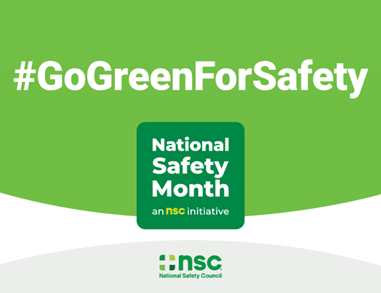National Safety Month is a time dedicated to raising awareness about safety practices and preventing accidents and deaths in various industries.
For facilities management and industrial cleaning industries, safety is of paramount importance due to the nature of the work. These sectors involve handling complex systems, hazardous materials, and operating heavy machinery, making them more susceptible to accidents and injuries.
The negative impact of stress on health is another important factor to consider as we explore National Safety Month. Prolonged stress can contribute to chronic health issues among employees. Thankfully, interventions within workplaces can aid adults in managing stress, subsequently lowering the effects of long-term health problems. Numerous tactics are available for organizations to adopt in order to decrease stress-inducing work conditions and foster better mental well-being among employees.
The International Labour Organization estimates that 2.3 million workers globally experience work-related accidents or injuries every year.
Why is National Safety Month Celebrated in June?
National Safety Month is celebrated in June for several reasons. First, June marks the beginning of summer in many parts of the world, bringing with it unique safety concerns such as extreme heat, outdoor activities, and increased travel. By highlighting safety during this time, organizations can equip their employees with the necessary knowledge and tools to navigate potential hazards.
By dedicating an entire month to safety awareness, businesses like TEAM can address workplace hazards, provide training sessions, and encourage employees to actively participate in creating a safe working environment. Understanding specific hazards as they relate to the head, face and eyes can also help keep workers stay safe.
Most Common Work-Related Injuries/Accidents:
- Slips, trips and falls
- Explosions and fires
- Repetitive strain/overexertion injuries
- Electrical accidents
- Chemical exposure
- Machinery accidents/collisions
- Falls from heights
- Falling objects
- Heat-related illness
- Cuts and punctures
This year, the National Safety Council (NSC) has selected the following safety themes for each week of the month:
Week 1 – Emergency Preparedness: The first week of June coincides with National CPR and AED Awareness Week. Being equipped with CPR and AED knowledge is crucial in emergencies, as it can make a life-saving difference.
Week 2 – Slips, Trips, and Falls: Falls are a significant cause of unintentional injuries and injury-related deaths. This week focuses on preventing slips, trips, falls, and falls from heights, with an emphasis on leveraging technology for enhancing safety.
Week 3 – Heat-Related Illness: Heat-related illnesses can escalate quickly, even becoming life-threatening. Understanding the symptoms and appropriate responses to such conditions can save lives.
Week 4 – Hazard Recognition: Being familiar with our surroundings doesn’t mean overlooking potential dangers. Throughout the day, it’s essential to remain vigilant in identifying and avoiding hazards to prevent injuries.
The Importance of Safety in Facilities Management and Industrial Cleaning Industries
Facilities management and industrial cleaning industries are responsible for maintaining and operating buildings, machinery, and equipment essential for various sectors to function efficiently. At TEAM, these services include everything from waste management and paint booth maintenance to decontamination and industrial roofing services. With multiple employees working in diverse settings, ensuring their safety and well-being becomes a top priority.
- Complexity of Operations: Facilities management involves overseeing complex infrastructure, including HVAC systems, electrical systems, elevators, and more. Industrial cleaning involves dealing with hazardous chemicals, confined spaces, and elevated surfaces. Proper training and adherence to safety protocols are crucial to avoid mishaps.
- High-Risk Tasks: These industries often require workers to handle heavy machinery, work at heights, or come into contact with dangerous substances. Failing to follow safety guidelines can lead to serious accidents, injuries, or even fatalities.
- Legal Compliance: Compliance with safety regulations and standards is essential for these industries to avoid penalties, lawsuits, and damage to their reputation. National Safety Month serves as a reminder to review and enhance safety practices to meet or exceed industry standards.
In 2019, Canada’s WCBs accepted a total of 271, 806 claims of lost time due to injury.
8 ways to minimize incidents in the workplace
- Comprehensive Training: Prioritize thorough training for all employees, including new hires and temporary workers. Training should cover safety procedures, equipment operation, hazard recognition, and emergency response protocols.
- Conduct Regular Safety Audits: Regularly assess workplace environments, equipment, and processes to identify potential hazards. Address any issues promptly to prevent accidents.
- Promote a Safety Culture: Encourage open communication about safety concerns and empower employees to report potential hazards without fear of reprisal. Recognize and reward employees who actively contribute to a safe work environment.
- Personal Protective Equipment (PPE): Ensure that all employees have access to and use appropriate PPE, such as gloves, safety goggles, hard hats, and respiratory protection, as needed.
- Implement Technology: Embrace technological advancements to improve safety. For instance, use sensors to monitor air quality, implement automated systems for repetitive tasks, and adopt virtual reality training to simulate hazardous scenarios.
- Regular Maintenance: Schedule regular inspections and maintenance for equipment and machinery to prevent malfunctions and accidents due to wear and tear.
- Emergency Preparedness: Develop and communicate clear emergency response plans for various scenarios. Conduct drills periodically to ensure employees are familiar with the procedures.
- Employee Wellness Programs: Encourage employee well-being through health and wellness initiatives. Healthy employees are more alert, focused, and less prone to accidents.
Based on a survey conducted by 360training, it was found that 56% of employees express a desire for additional safety training.
By proactively adopting these tips and integrating them into their safety practices, facilities management and industrial cleaning industries can significantly reduce workplace accidents, create a safer working environment, and protect the well-being of their valuable workforce.
Remember, safety is a collective responsibility. Let’s commit to observing National Safety Month, not just in June, but throughout the year, to ensure the well-being of our employees and the success of our organizations.
How does TEAM promote worker safety?
TEAM is dedicated to fostering a culture of worker safety through a multifaceted approach that encompasses various impactful initiatives:
- Optimized Facility Resources: Our commitment extends to customer sites, where we ensure that resources are tailored to enhance worker safety and well-being.
- Dynamic Toolbox Talks: We believe in proactive engagement, offering dynamic sessions like wellness rooms and pre-work stretches, promoting physical and mental preparedness.
- Empowerment as Team Leaders: We empower our employees to become leaders within their teams, fostering a sense of ownership and responsibility for safety at all levels.
- Emergency Preparedness: Rigorous drills and regular reassessments are conducted with both customers and employees, ensuring collective readiness to effectively respond to emergencies.
- Cutting-edge Safety Solutions: Investment in advanced safety management software and comprehensive training programs underscores our commitment to staying at the forefront of safety practices.
- Inspiring Conferences: Our commitment to safety is amplified through conferences that unite our team with the broader safety message, reaffirming its position as a cornerstone of our ethos.
Through these endeavors, TEAM not only promotes worker safety but also cultivates a holistic environment where every member is equipped, engaged, and empowered to champion safety in every facet of their work journey.
At TEAM, we are committed to:
- Meticulously planning safety protocols for our daily activities.
- Establishing transparent safety objectives and metrics company wide.
- Securing commitment from our executive leadership towards safety goals.
- Continuously monitoring and evaluating our safety performance.
- Swiftly implementing changes and corrective actions when necessary.
- Providing ongoing training, fostering awareness, and engaging our workers.
- Enforcing robust subcontractor safety management and pre-qualification processes.
- Conducting regular safety meetings across all departments.
- Conducting post-incident reviews and root cause analyses, applying lessons learned.
- Regularly conducting inspections, audits, and reviews to uphold safety standards.
- Openly practice workplace safety, engaging employees to focus on physical and mental health.
- Celebrate action with TEAM corporate and customer site safety-related awards.
TEAM Safety Stand-Downs and OPSs
TEAM promotes safety awareness by conducting Safety Stand-Downs and One-Point Lessons (OPLs), during which employees take a break to engage in activities like toolbox talks, safety equipment inspections, rescue plan development, or discuss job-specific hazards. Managers are encouraged to customize these stand-downs to suit their teams’ specific duties.
National Safety Month is a crucial time for the facilities management and industrial cleaning industries to reinforce their commitment to workplace safety. By recognizing the unique challenges they face and implementing comprehensive safety measures, these industries can minimize accidents, protect their workforce, and maintain a productive and thriving work environment. In doing so, they contribute to the creation of not only safer workplaces but also healthier ones. When employees feel secure and safeguarded in their work environments, their satisfaction and morale are boosted, resulting in a happier workforce. Moreover, these efforts have a ripple effect that extends beyond the workplace, reaching into the realm of families and communities. By prioritizing safety, these industries directly contribute to the security and well-being of employees’ families, promoting a sense of reassurance and stability.
National Safety Month serves as a powerful reminder that the efforts invested in safeguarding employees’ well-being do not only result in secure workplaces. They create a ripple of positive effects that extend to happier employees and families as well as thriving communities.







